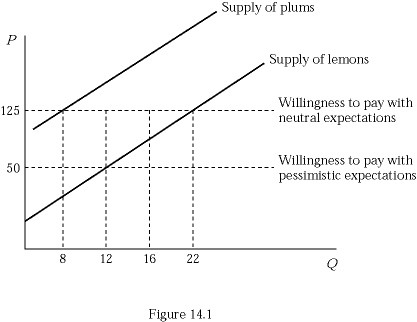When the price of a good is above its equilibrium price, a:
a. surplus puts upward pressure on the price.
b. surplus puts downward pressure on the price.
c. shortage puts upward pressure on the price.
d. shortage puts downward pressure on the price.
b
Economics
You might also like to view...
Everything else equal, wages are likely to be higher when
a. the location of the job is more desirable. b. the work environment is more prestigious. c. more skill is required to perform well on the job. d. the work is safer.
Economics
 Figure 14.1 represents the market for used bikes. Suppose buyers are willing to pay $200 for a plum (high-quality) used bike and $50 for a lemon (low-quality) used bike. If buyers have pessimistic expectations about the used bikes in the market, how many used plums (high-quality used bikes) will be sold?
Figure 14.1 represents the market for used bikes. Suppose buyers are willing to pay $200 for a plum (high-quality) used bike and $50 for a lemon (low-quality) used bike. If buyers have pessimistic expectations about the used bikes in the market, how many used plums (high-quality used bikes) will be sold?
A. 0 B. 8 C. 12 D. 16
Economics